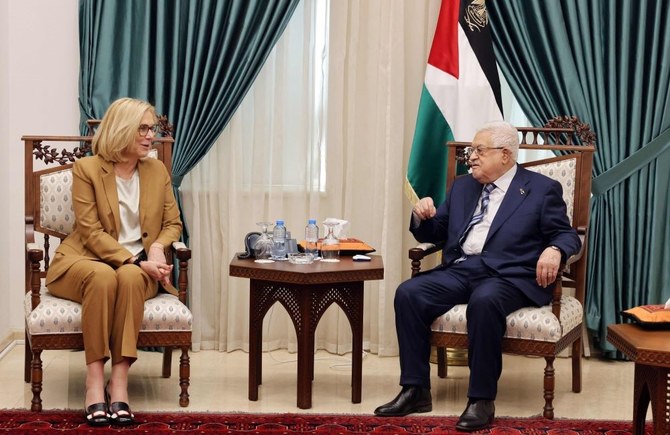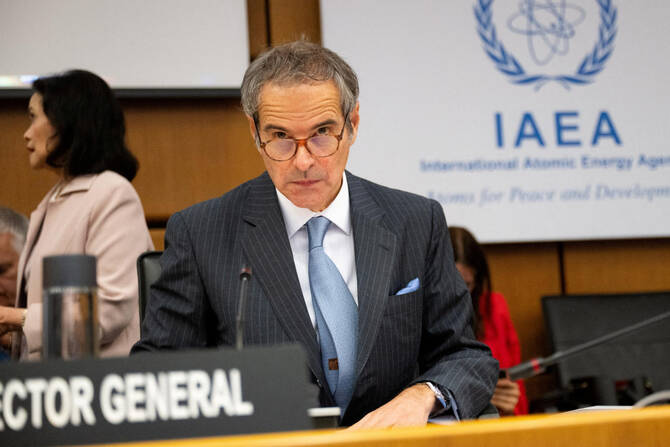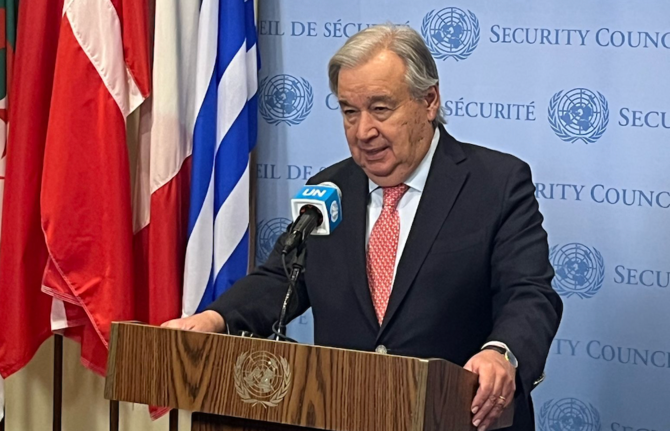CAIRO: Palestinian President Mahmoud Abbas has stressed “categorical Palestinian rejection” of the principles announced in Israeli Prime Minister Benjamin Netanyahu’s so-called post-war plan for Gaza.
Netanyahu wants Israel to retain security control over Palestinian areas and make reconstruction dependent on demilitarization.
His plan, which brings together a range of well-established Israeli positions, underlines Netanyahu’s resistance to the creation of a Palestinian state which he sees as a security threat.
Arab League Secretary-General Ahmed Aboul Gheit has received a written message from Abbas which calls for a global conference to adopt a comprehensive peace plan with international guarantees and a timeline for implementation of the ending of the Israeli occupation of Palestinian territories.
Abbas has called on the league to support Palestine in obtaining full membership of the UN.
The message urged countries that have not yet recognized Palestine to do so.
Aboul Gheit received Ambassador Muhannad Al-Aklouk, representative of Palestine to the bloc, at the headquarters of the general secretariat, and Al-Aklouk had brought a message from Abbas.
Jamal Rushdi, a spokesperson for the Arab League chief, said that the president’s message included a categorical Palestinian rejection of the principles announced by the Israeli prime minister for the so-called “day after of the war.”
The message included a warning of the danger of those principles — especially the denial of the existence of the Palestinian people, and insisting on imposing Israeli sovereignty on the land extending from the Mediterranean Sea to the Jordan River.
Abbas charged that the plan confirmed the Israeli government’s intentions to recolonize the Gaza Strip and perpetuate the occupation in the West Bank and East Jerusalem through plans to build thousands of settlement units.
Rushdi said that the message warned that the goal of the Israeli government was not only to undermine the chances of peace based on the two-state solution, but also to intensify ethnic cleansing and displacement of Palestinians from the Gaza Strip, the West Bank, and East Jerusalem.
The president’s message included the affirmation that the Gaza Strip is an integral part of the State of Palestine.
The Palestinian Authority is ready to assume the responsibilities of governance in the Gaza Strip, the West Bank, and East Jerusalem, and is prepared to work toward establishing security and peace, as well as stability, in the region within the framework of a comprehensive peace plan.
The message called on the Arab League’s chief to continue working for a ceasefire; the provision of humanitarian aid; the return of displaced people to their homes in the north; the prevention of their displacement; and a halt to Israel’s expansionist plans and practices in the Gaza Strip.
Aboul Gheit confirmed to Al-Aklouk that he would continue to work to achieve all the goals highlighted in the president’s message — most notably an immediate ceasefire, working to bring aid in urgently and sustainably, and standing with full force against the displacement plan.
Aboul Gheit stressed that stopping the war remained a fundamental priority for the Arab League and its member states.
He reiterated that the Palestinians, Arabs, and the world always rejected the displacement plan.
Aboul Gheit pointed out that addressing the humanitarian catastrophe caused by Israeli aggression could not be achieved in isolation from a settlement aiming at the emergence of a Palestinian state in the West Bank and Gaza.
He emphasized that the Palestinians were capable of governing themselves.
Aboul Gheit added that the continuation of the occupation was no longer possible and that the two-state solution remained the only formula capable of achieving security, peace, and stability between Palestinians and Israelis in the region and the world.






















